-
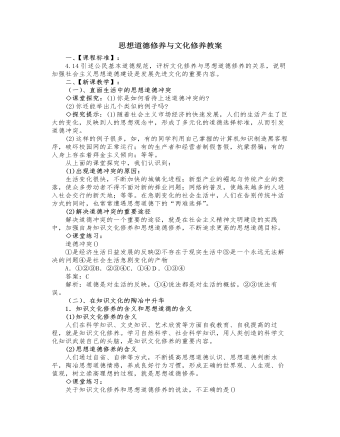
人教版高中政治必修3思想道德修养与文化修养教案
(2)这样的例子很多,如,有的同学利用自己掌握的计算机知识制造黑客程序,破坏校园网的正常运行;有的生产者和经营者制假售假,坑蒙拐骗;有的人身上存在着拜金主义倾向;等等。从上面的课堂探究中,我们认识到:(1)出现道德冲突的原因:生活变化很快,不断加快的城镇化进程;新型产业的崛起与传统产业的衰落,使众多劳动者不得不面对新的择业问题;网络的普及,使越来越多的人进入社会交行的新天地;等等。在急剧变化的社会生活中,人们在告别传统牛活方式的同时,也常常遭遇思想道德下的“两难选择”。(2)解决道德冲突的重要途径解决道德冲突的一个重要的途径,就是在社会主义精神文明建设的实践中,加强自身知识文化修养和思想道德修养,不断追求更高的思想道德目标。◇课堂练习:道德冲突()①是经济生活日益发展的反映②不存在于现实生活中③是一个永远无法解决的问题④是社会生活急剧变化的产物
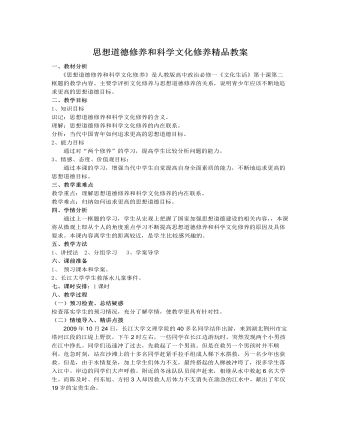
人教版高中政治必修3思想道德修养和科学文化修养精品教案
一、教材分析《思想道德修养和科学文化修 养》是人教版高中政治必修一《文化生活》第十课第二框题的教学内容。主要学评析文化修养与思想道德修养的关系,说明青少年应该不断地追求更高的思想道德目标。二、教学目标1、知识目标识记:思想道德修养和科学文化修养的含义。理解:思想道德修养和科学文化修养的内在联系。分析:当代中国青年如何追求更高的思想道德目标。2、能力目标通过对“两个修养”的学习,提高学生比较分析问题的能力。3、情感、态度、价值观目标:通过本课的学习,增强当代中学生自觉提高自身全面素质的能力,不断地追求更高的思想道德目标。三、教学重难点教学重点:理解思想道德修养和科学文化修养的内在联系。教学难点:归纳如何追求更高的思想道德目标。四、学情分析通过上一框题的学习,学生从宏观上把握了国家加强思想道德建设的相关内容,,本课将从微观上即从个人的角度重点学习不断提高思想道德修养和科学文化修养的原因及具体要求。本课内容离学生的距离较近,是学 生比较感兴趣的。
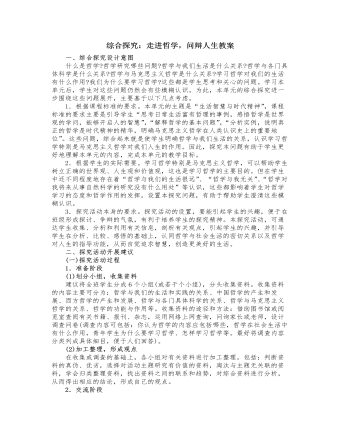
人教版高中政治必修4综合探究:走进哲学,问辩人生教案
1.根据课程标准的要求。本单元的主题是“生活智慧与时代精神”,课程标准的要求主要是引导学生“思考日常生活富有哲理的事例,感悟哲学是世界观的学问,能够开启人的智慧”,“解释哲学的基本问题”,“分析实例,说明真正的哲学是时代精神的精华,明确马克思主义哲学在人类认识史上的重要地位”。这些问题,综合起来就是使学生明确哲学与我们生活的关系,认识学习哲学特别是马克思主义哲学对我们人生的作用。因此,探究本问题有助于学生更好地理解本单元的内容,完成本单元的教学目标。2.根据学生的实际需要。学习哲学特别是马克思主义哲学,可以帮助学生树立正确的世界观、人生观和价值观,这也是学习哲学的主要目的。但在学生中还不同程度地存在着“哲学与我们的生活很远”、“哲学与我无关”、“哲学对我将来从事自然科学的研究没有什么用处”等认识,这些都影响着学生对哲学学习的态度和哲学作用的发挥。设置本探究问题,有助于帮助学生澄清这些模糊认识。
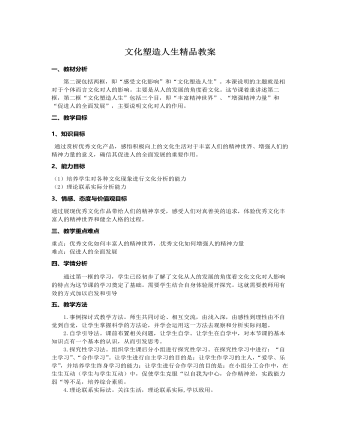
人教版高中政治必修3文化塑造人生精品教案
A.人创造了文化,文化创B.人创造了文化,文化也塑造着人,不断丰富着人的精神世界C.文化具有潜移默化的作用D.世界观、人生观、价值观是人们文化素养的核心和标志2、在我国全面建设小康社会的过程中,我们要把民族精神教育纳入国民教育全过程,纳入精神文明建设全过程,使全体人民始终保持昂扬向上的精神状态。这是由于()A.文化能够丰富人的精神世界B.文化能够增强人的精神力量C.文化能够促进人的全面发展D.人的思想意识对事物发展起决定作用3、我国已进入全面建设小康社会,加快推进社会主义现代化的新的发展阶段,人们的温饱问题基本解决,健康有了基本保障。随着物质生活需要逐步得到满足,人们更加注重精神生活需要的满足,对文化活动表现出日渐浓厚的兴趣,文化消费在生活消费中的比重越来越大。这段话主要说明的是,新时期:
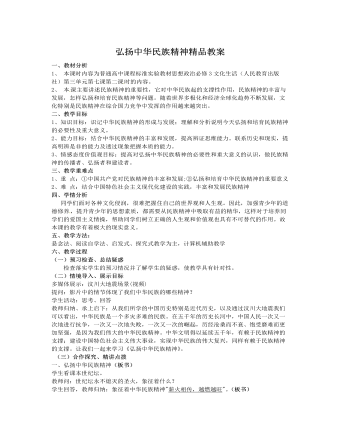
人教版高中政治必修3弘扬中华民族精神精品教案
9.我们的祖国历史悠久,文化灿烂。我国是世界著名的四大文明古国之一,有近5000年的文字记载的悠久历史,我国各民族人民创造了灿烂的古代文化和科学技术。张衡发明的“浑天仪”、“地动仪”比欧洲早1700多年;祖冲之的“圆周率”推算,比西方世界早了1000多年;华佗的全身麻醉技术也比西方早10000多年;炼铁技术的发明比欧洲早1900多年……中国的“四大发明”更是推动了人类历史文明的进程。5000多年的历史造就了中华民族灿烂的文化,涌现出大批伟大的思想家、文学家、艺术家,也出现了一大批优秀的艺术作品,这都是先人留给我们的宝贵精神财富。以上材料说明 ( )①中华文化历史悠久,源远流长是中华文化的基本特征 ②中华文化博大精深,具有非常丰富的内容 ③中华民族对人类世界的发展做出了巨大的贡献 ④中华文化曾长期居于世界文化发展的 前列,是世界上最优秀的民族文化之一A. ①② B. ①②③ C. ①②③④ D. ①②④
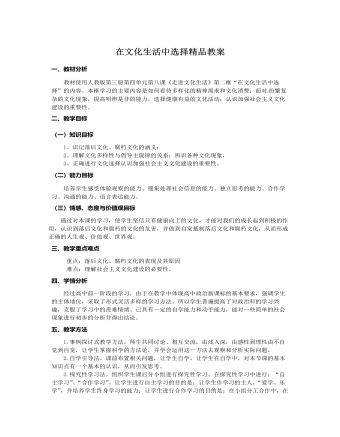
人教版高中政治必修3在文化生活中选择精品教案
一、教材分析教材使用人教版第三册第四单元第八课《走进文化生活》第二框“在文化生活中选择”的内容。本框学习的主要内容是如何看待多样化的精神需求和文化消费;面对 纷繁复杂的文化现象,提高明辨是非的能力,选择健康有益的文化活动;认识加强社会主义文化建设的重要性。二、教学目标(一)知识目标1、识记落后文化、腐朽文化的涵义;2、理解文化多样性与倡导主旋律的关系;辨识各种文化现象,3、正确进行文化选择认识加强社会主义文化建设的重要性。(二)能力目标培养学生感受体验观察的能力、搜集处理社会信息的能力、独立思考的能力、合作学习、沟通的能力、语言表达能力。(三)情感、态度与价值观目标通过对本课的学习,使学生坚信只有健康向上的文化,才能对我们的成长起到积极的作用,认识到落后文化和腐朽的文化的危害,并做到自觉抵制落后文化和腐朽文化,从而形成正确的人生观、价值观、世界观。
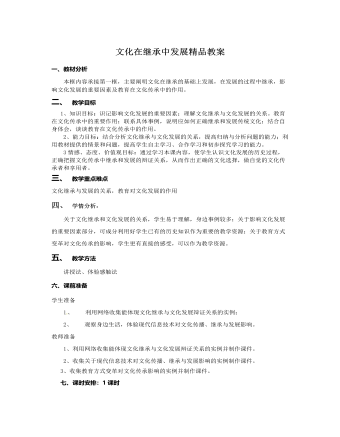
人教版高中政治必修3文化在继承中发展精品教案
二、 教学目标1、知识目标:识记影响文化发展的重要因素;理解文化继承与文化发展的关系。教育在文化传承中的重要作用;联系具体事例,说明应如何正确继承和发展传统文化;结合自身体会,谈谈教育在文化传承中的作用。2、能力目标:结合分析文化继承与文化发展的关系,提高归纳与分析问题的能力;利用教材提供的情景和问题,提高学生自主学习、合作学习和初步探究学习的能力。3情感、态度、价值观目标:通过学习本课内容,使学生认识文化发展的历史过程,正确把握文化传承中继承和发展的辩证关系,从而作出正确的文化选择,做自觉的文化传承者和享用者。三、 教学重点难点文化继承与发展的关系,教育对文化发展的作用四、 学情分析:关于文化继承和文化发展的关系,学生易于理解,身边事例较多;关于影响文化发展的重要因素部分,可成分利用好学生已有的历史知识作为重要的教学资源;关于教育方式变革对文化传承的影响,学生更有直接的感受,可以作为教学资源。
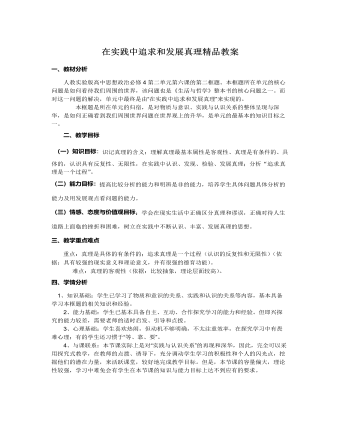
人教版高中政治必修4在实践中追求和发展真理精品教案
一、教材分析人教实验版高中思想政治必修4第二单元第六课的第二框题。本框题所在单元的核心问题是如何看待我们周围的世界,该问题也是《生活与哲学》整本书的核心问题之一。而对这一问题的解决,单元中最终是由“在实践中追求和发展真理”来实现的。 本框题是所在单元的归宿,是对物质与意识、实践与认识关系的整体呈现与深华,是如何正确看到我们周围世界问题在世界观上的升华,是单元的最基本的知识目标之一。 二、教学目标(一)知识目标:识记真理的含义;理解真理最基本属性是客观性、真理是有条件的、具体的,认识具有反复性、无限性,在实践中认识、发现、检验、发展真理;分析“追求 真理是一个过程”。(二)能力目标:提高比较分析的能力和明辨是非的能力,培养学生具体问题具体分析的能力及用发展观点看问题的能力。(三)情感、态度与价值观目标:学会在现实生活中正确区分真理和谬误,正确对待人生道路上面临的挫折和困难,树立在实践中不断认识、丰富、发展真理的思想。
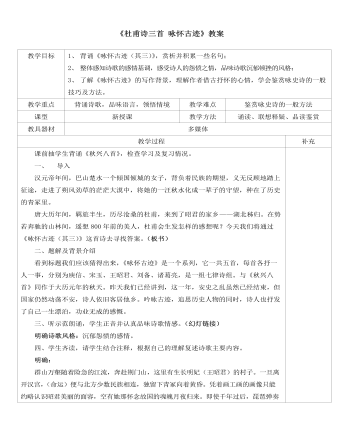
人教版高中语文必修3《杜甫诗三首 咏怀古迹》教案
“千载琵琶作胡语,分明怨恨曲中论。”“怨恨”两字点明全篇主旨。千百年来,琵琶所演奏的总是从匈奴传来的撩人愁思的胡乐,正是昭君在诉说着她的怨恨!这两句从侧面烘托昭君的形象,既有对她的赞扬,又有对她的同情。读到这里,我们的耳边好像又响起了那深沉、幽怨的琵琶声!5、这首诗写的是昭君的怨恨,但首联一开始并没有写她的怨恨,写的是什么?这样写的目的又是什么?明确:群山万壑赴荆门山是群山起伏,连绵不绝;水是万壑争流,奔腾不息,直赴荆门山。其中的“赴”字用了拟人的手法,把迤逦不绝的千山万壑陡然间写活了,既有飞动之势,又有变幻之姿。从侧面烘托昭君的形象。两千多年前,一个青年女子远离父母之邦,嫁到异域,并在那里度过一生,确实需要巨大的勇气和毅力,而这雄伟的山川简直就是她那坚强的性格的象征。6、佳句鉴赏(这首诗歌当中,我认为有两句诗写得非常美,我自己很喜欢,不知道有没有同道中人?)
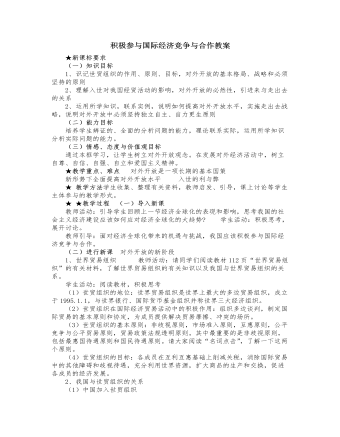
人教版高中政治必修1积极参与国际经济竞争与合作教案
学生活动:认真阅读,积极思考。教师总结:这样一个人口大国,依靠外国是不能解决温饱问题的,更谈不上社会主义现代化。实行对外开放,发展对外经济关系,必须坚持独立自主、自力更生原则,并以此为自己发展的根本基点。但坚持坚持独立自主、自力更生,并不是闭关自守、盲目排外,而是在立足自身基础上实行对外开放,把二者结合起来。(三)课堂总结、点评这节课我们重点学习了我国对外开放方面的有关知识,知道了在经济全球化的国际大趋势下,社会主义现代化建设必须实行对外开放,积极参与国际经济竞争与合作。了解了我国对外开放的成就、格局、新形势下的基本政策和战略。这对于我们在正确地认识国际经济关系,增强社会主义优越感和民族自强意识,自觉投身现代化建设等将有重大指导作用。
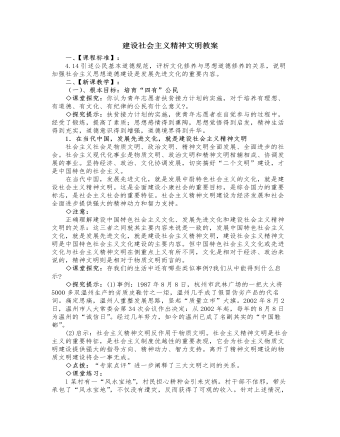
人教版高中政治必修3建设社会主义精神文明教案
(2)伟大的意义:这些精神文明创建活动,是人民群众“移风易俗”、改造社会的伟大创造,也是人民群众自我教育、自我提高的有效途径。各具特色的精神文明创建活动,使人们在自觉参与的过程中思想感情得到熏陶,思想觉悟得到启发,精神生活得到充实,道德意识得到增强,道德境界得到升华。这对整个中华民族的精神面貌,正在产生不可估量的积极影响。◇点拨:“相关链接”描述了青年志愿者活动,引导学生感悟其精神,升华道德境界,增强参与意识。(3)必然的选择:投身于社会主义精神文明建设的伟大实践,做新时期中国先进文化的传播者和建设者,是当代中国青年成长、成才的必然选择。◇拓展延伸:在群众性精神文明创建活动中涌现出的先进人物和英雄模范,像孔繁森、张海迪、徐洪刚、韩素云、李国安、徐虎、李素丽等,在全社会起到了良好的示范作用;提出的一些响亮口号,如“从我做起,从现在做起”“岗位学雷锋,行业树新风”“单位做个好职工,社会做个好公民,家庭做个好成员”等,不断激励着人们。
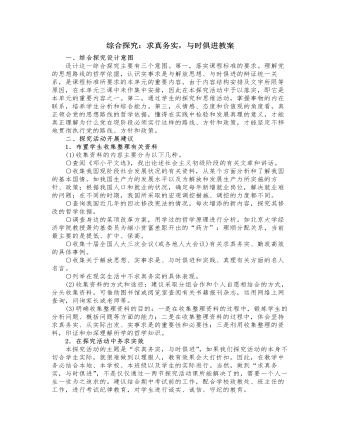
人教版高中政治必修4综合探究:求真务实,与时俱进教案
7.我国人力资源开发利用面临四大挑战在全面建设小康社会进程中,我国人力资源开发与利用面临着以下四个方面严峻挑战。(1)劳动力供给高峰的到来加剧了劳动力供求总量矛盾。持续的经济增长和人口计划生育控制,使得我国人口再生产在不到30年的时间内完成了从“高出生率、低死亡率、高自然增长率”的类型到“低出生率、低死亡率、低自然增长率”类型的转变,人口在日增长率已经连续数年低于千分之十。然而,庞大的人口基数及其低速增长仍对中国未来经济增长和社会发展带来巨大的就业压力,大量预测表明,未来20年是中国人口数量增长和劳动力供给的高峰时期。20世纪90年代以来,中国劳动年龄人口比重(16—59岁年龄组)由1990—1996年期间的61%~62%上升到1999年的63.2%。这种趋势将会持续到2020年左右达到峰值,直到老龄化进程抵消了数量增长效应,劳动年龄人口的比重才会趋于下降。到2020年,中国劳动年龄人口将由2000年的8.61亿上升到10.04亿,平均每年新增劳动力715万人。
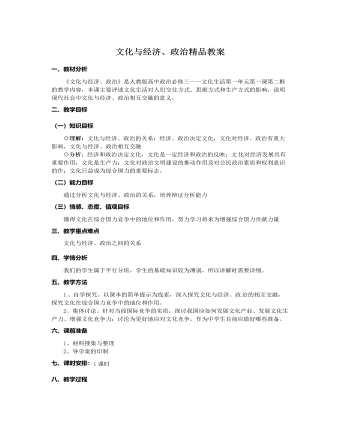
人教版高中政治必修3文化与经济、政治精品教案
一、教材分析《文化与经济、政治》是人教版高中政治必修三——文化生活第一单元第一课第二框的教学内容,本课主要评述文化生活对人们交往方式、思维方式和生产方式的影响,说明现代社会中文化与经济、政治相互交融的意义。二、教学目标(一)知识目标◇理解:文化与经济、政治的关系:经济、政治决定文化,文化对经济、政治有重大影响,文化与经济、政治相互交融 ◇分析:经济和政治决定文化,文化是一定经济和政治的反映;文 化对经济发展具有重要作用,文化是生产力;文化对政治文明建设的推动作用及对公民政治素质和权利意识的作;文化日益成为综合国力的重要标志。(二)能力目标通过分析文化与经济、政治的关系,培养辩证分析能力(三)情感、态度、值观目标懂得文化在综合国力竞争中的地位和作用,努力学习将来为增强综合国力贡献力量

新人教版高中英语必修1Unit 1 Teenage Life-Listening and Speaking & Listening and Talking教案
Step 2 Listening and Talking1. The teacher is advised to talk with their new students about the related topic: Boys and girls, do you know some structures to talk about future activities? Talking about future activitiesWe’ll …I plan to …There’ll be …I hope to …We’re going to …2. After their small talk, the teacher can move on by playing the listening and solve the following task.Underline the expressions in the sentences below Cao Jing and Max use to talk about the future.We’ll learn useful skills.I plan to improve my spoken English.There’ll be students from different schools.I hope to make new friends.We’ll talk about teenage life.I’ll learn to make a fire.There’ll be students from different countries at the camp.There’ll be some experts there to show us how to live in the wild.We’re going to learn about wildlife.I’m going to give a speech.I think I’m going to enjoy the activities.I think we’ll have a lot of fun.3. Work in groups. Plan a youth camp.Teacher make the Ss think of ideas for the camp. And they can use the questions below to get started. And have the Ss present their ideas for a youth camp to the class.●What kind of camp is it?●Who will be there?●What will they do?●What will they learn?

新人教版高中英语必修3Unit 1 Festivals and Celebrations-Listening &Speaking&Talking教学设计
The theme of this section is “Talk about festival activities and festival experiences”.Festival and holiday is a relaxing and interesting topic for students. This part talks about the topic from the daily life of students’. In the part A ---Listening and Speaking, there are three conversations among different speakers from three countries(Japan, Rio and China), where the speakers are participating in or going to participate in the festivals and celebrations. So listening for the relationship among them is a fundamental task. Actually, with the globalization and more international communication, it is normal for Chinese or foreigners to witness different festivals and celebrations in or out of China. In the Conversation 1, a foreign reporter is interviewing a Japanese young girl who just had participated in the ceremony of the Coming-of-Age Day on the street and asking her feeling about the ceremony and the afterwards activities. Conversation 2, Chinese girl Li Mei is witnessing the Rio Carnival for the first time, and her friend Carla gives her some advice on the costumes which enables her to match with the carnival to have a good time. Conversation 3, a Chinese guide is showing a group of foreign visitors around the Lantern Festival and introducing the customs of the festival to them. The three conversations have a strong vitality and insert the festival and cultural elements from different countries. So perceiving the festivals and cultures from different countries is the second task. At the same time, the scripts also insert the targeted grammar --- v-ing as attributive and predicative, which students can perceive and experience in a real context and make a road for the further study. That is the third task. In the Part B--- Listening and Talking, the theme is “Talk about festival experience”, which is the common topic in our daily conversations. During the conversation, Song Lin, a Chinese student, asked Canadian friend Max about how to spend Christmas. In the conversation, Song Lin talked about experience and the feelings during the Chinese Spring Festival, during which there are not only some enjoyable things but some unpleasant things. After the listening, perhaps students find there are some similarities between Christmas and the Chinese Spring Festival as there are some differences in the origins and celebrations. For example, people always visit friends and relatives, decorate their houses, have a big dinner together, chat and give presents to each other.

新人教版高中英语必修3Unit 1 Festivals and Celebrations-Reading for Writing教学设计一
The topic of this part is “Write about your festival experience”.During the Listening and Speaking and Talking, students are just asked to say out their festival experiences such as the Spring Festival, Mid-autumn Day, but this part students will be asked to write down their own festival experiences. During the reading part, it introduces the Naadam Festival in Inner Mongolia Autonomous Region, which can give students a good example to imitate. Students not only learn the festival, but touch and feel the Inner Mongolian’s character, the spirit and cultural atmosphere, which can help students form the cultural awareness and learn to enjoy and value the diversity of Chinese culture.Concretely, the dairy tells the experience that the author spent the Naadam Festival in Inner Mongolia Autonomous Region with his/her friend. The structure is clear. In the opening paragraph, it introduces the topic of the Naadam Festival and the whole feeling. Then it introduces the items of the festival like the ceremony, wrestling and horse racing. Finally, it summarizes this experience. Because this part is a travel journal, we must guide students pay more attention to these details: 1. use the first person. 2. use the past tense to tell the past thing and use the present or future tense to describe the scenery. 3. use the timeline to tell the development. 4. be careful for the author’s psychology, emotion and feeling, etc.1. Read quickly to get main idea; read carefully to get the detailed information about Naadam Festival.2. Learn the structure of the reading article and language.3. Write an article about a festival experience4. Learn to use the psychology, emotions and feeling in the writing.1. Write an article about a festival experience.2. Use the structure of the reading article and language.

新人教版高中英语必修3Unit 3 Diverse Cultures-Discovering Useful Structure教学设计
Step 4 PracticeRead the conversation. Find out which words have been left out.Justin: Linlin, I’m going to Guizhou Province next month. I’m super excited! Any recommendations for places to visit?Linlin: Wow, cool! Guizhou is a province with a lot of cultural diversity. Places to visit...well, definitely the Huangguoshu Waterfall first.Justin: What’s special about the waterfall?Linlin: Well, have you ever heard of the Chinese novel Journey to the West ?Justin: Yes, I have. Why ?Linlin: In the back of the waterfall, you will find a cave, which is the home of the Monkey King.Justin: Really? Cool! I’ll definitely check it out.Linlin:And I strongly recommend the ethnic minority villages. You’ll find Chinese culture is much more diverse than you thought.Justin:Sounds great, thanks.Answers:Justin: Linlin, I’m going to Guizhou Province next month. I’m super excited! Do you have any recommendations for places to visit?Linlin: Wow, that’s cool! Guizhou is a province with a lot of cultural diversity. What are some places to visit in Guizhou ? Well, definitely the Huangguoshu Waterfall is the first place to visit in Guizhou Province.Justin: What’s special about the waterfall?Linlin: Well, have you ever heard of the Chinese novel Journey to the West ?Justin: Yes, I have heard of the Chinese novel Journey to the West . Why do you ask if I have heard of the Chinese novel Journey to the West?Linlin: In the back of the waterfall, you will find a cave, which is the home of the Monkey King from Journey to the West.Justin: That’s really true? It’s Cool! I’ll definitely check it out.Linlin:And I strongly recommend the ethnic minority villages on your trip to Guizhou Province. You’ll find Chinese culture is much more diverse than you thought it was.Justin:This all sounds great, thanks.

新人教版高中英语必修3Unit 4 Space Exploration-Discovering Useful Structure教学设计
The theme of the section is “Describe space facts and efforts to explore space”. Infinitives are one of non-finite verbs, as the subjects, objects, predicative, attributes and adverbials. This unit is about space exploration, which is a significant scientific activity, so every scientific activity has strong planning. Therefore, using the infinitives to show its purpose, explanations or restrictions is the best choice.1. Learn the structure, functions and features of infinitives.2. Learn to summarize some rules about infinitives to show purpose and modify.3. Learn to use infinitives in oral and writing English. 1. Learn the structure, functions and features of infinitives.2. Learn to summarize some rules about infinitives to show purpose and modify.3. Learn to use use infinitives in oral and writing English.Step 1 Lead in---Pair workLook at the following sentences and focus on the italicized infinitives. In pairs, discuss their functions. 1. I trained for a long time to fly airplanes as a fighter pilot..(作目的状语)2. As we all know, an astronaut needs to be healthy and calm in order to work in space..(作目的状语)3. First of all, you must be intelligent enough to get a related college degree..(作目的状语)4. Some scientist were determined to help humans realise their dream to explore space..(作定语)5. On 12 April 1961, Yuri Gagarin became the first person in the world to go into space..(作定语)Summary:1. 不定式的结构:to+do原形。2. 分析上面的句子,我们知道在描述太空探索时,动词不定式不仅可以用来表目的,还可以用来作定语,表修饰。

新人教版高中英语必修3Unit 5 The Value of Money- Discovering Useful Structure教学设计
Step 3 Meaning1. 过去将来时表示从过去某一时间来看将要发生的动作或存在的状态, 常用在宾语从句中。一般由“would/should +动词原形”构成。She hoped that they would meet again someday. 她希望将来有一天他们能再见面。2. was/were going to+动词原形: 表示过去将要发生或很有可能发生的动作, 常用于口语中, 表示预言、意图或者打算等。He was going to start work the following week. 他打算下星期开始工作。3. was/were about to do: 常用来表示即将发生的动作, “刚要/正要做……”。注意该结构不与任何时间状语连用。I felt that something terrible was about to happen. 我感到某种可怕的事情即将发生。4.was/were to do: 表示“曾计划做某事”, 如果表示“本来计划做某事, 动作没实现”, 则需用 “was/were to have done”。She said she was to have told me about the accident. 她说她本来想告诉我关于事故的事。5.Start, go, come, leave, see, meet等动词的过去进行时: 表示就过去某一时刻而言即将发生的动作。She was coming later. 她随后就来。I had just put on my overcoat and was leaving to visit a friend of mine. 我刚穿上外套要去看我的一个朋友。

新人教版高中英语必修3Unit 5 The value of money-Reading and Thinking教学设计二
? Could you offer me some kind of work here?? I don’t want your charity, I just want an honest job.? Careless: I landed in Britain by accident.Step 7:Consolidation.? Find Henry? Roderick and Oliver were I .making a bet when they saw Henry, a poor young man. ? Know Henry? About a month ago, Henry was sailing and later he found himself carried out to sea by a strong wind. Fortunately, he 2.was spotted by a ship. And it was the ship that brought him to 3.England? Offer money to Henry ? Oliver and Roderick gave Henry a letter and told him that there was money in it. They 4.persuaded him to accept it, and made him 5.promise that it wouldn't be opened until 2 o'clock.Step 8:Language pointsa large amount of: a large quantity of; a great deal ofe.g. They bought a large amount of furniture before they moved their new house.make a bet: make an arrangement to risk money, etc. on an event of which the result is doubtful.e.g. We made a bet on the result of the match.permit sb to do something: allow somebody to do somethinge.g. My mother doesn’t permit me to ride in the street after it rained.by accident: as a result of chancee.g. I only found it by accident.stare at: look at somebody or something with the eyes wide open in a fixed gaze( in astonishment, wonder, fear, etc)to be honest: to tell you the truth; to be franke.g. To be honest, I don’t think we have a chance of winning.Step7 Homework:What do you think will happen to Henry? Will the bank-note help him or get him into trouble?